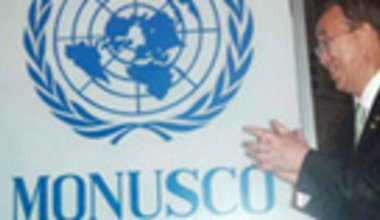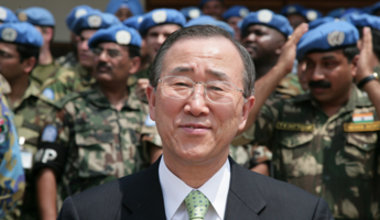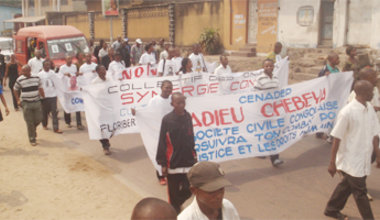MONUC asks DRC Government to issue messages consistent with the National Disarmament Plan to
Ituri armed groups
Addressing the press conference, the HCR Head of External Relations, Jens Hesemann, reported massive arrival of Congolese refugees in DRC from Uganda. «Between 15 and 17,000 Congolese found refuge in Uganda since mid-December. The refugees entered Uganda on two fronts: 10,000 from Ishasa, a town in North Kivu sharing common border with Uganda, and between 5 and 7,000 from Nkondo, along Lake Albert, near Ituri». Mr. Hesemann said. The bulk of the group is made up of women and children. «Refugees' poor health condition necessitates humanitarian assistance. HCR, in conjunction with UNICEF, PAM, MSF and other aid workers, have been providing them with clean drinking water and elementary health care at entry points in Uganda», he indicated. He added that HCR was verifying information about the prompt return of 7,000 refugees since last week. « An HCR-conducted census suggested that there are 3,000 more Congolese refugees in Ishasa out of the 10,000. HCR fears a new wave of populations displacements in North Kivu to Uganda », Jens Hesemann said.
Briefing on the activities of UN Special Representative for the DRC, William Lacy Swing, the spokesman reported that the latter is due to visit the African Union's headquarters in Addis-Ababa, Ethiopia on 22-23 January 2005, to meet with the head of the African Union, Alpha Oumar Konaré. This visit follows the twenty-third summit organised by the AU Peace and Security Council, held in Libreville, Gabon on 10 January 2005.
Mr. Swing held talks with the Uruguayan Defence Minister, Yamandu Fau at MONUC headquarters on 17 January 2005. The day before, he visited Kindu where he inspected a Uruguayan water unit. The visit is indicative of the importance Uruguay attaches to the DRC peace process. « With 1,778 peacekeepers contributed, Uruguay is the most important troop-contributing country to MONUC in Latin America», Mr. Bah added.
MONUC spokesman further announced that the Deputy Special Representative of the UN Secretary-General for the DRC, Ross Mountain, conducted his first exploratory mission to Eastern DRC on 15 to 17 January 2005. Mr. Mountain, who is also the new UNDP Resident Representative and Coordinator of humanitarian activities for the UN System in DRC, was accompanied by the heads of the UN Office for the coordination of Humanitarian Affairs (OCHA) and UNPD. He travelled to Bunia, Lubero, Kirumba, Kanya, Goma, Bukavu and Uvira to « assess the security and humanitarian situation for the local civilian population», the spokesman said. Mr. Mountain further visited a displaced camp in Bunia where houses and bridges were brought down in Uvira. At the end of his visit, he expressed «deep dismay over the sexual abuses committed against women, more particularly in South Kivu».
Mamadou Bah also announced the arrival of the new MONUC chief of staff, General Jean-François Collot d'Escury from France in Kinshasa on 14 January 2005. « His appointment fits into MONUC restructuring scheme including the increase of its strength». He as well recalled the visit of the new MONUC Deputy Commander of Forces, Major General Patrick Cammaert from the Netherlands on 8 January 2005 who «will officially assume his duties early February», the spokesman stressed.
Mr. Bah finally announced the visit by a delegation of UN Civilian Police advisers from New York on 20 January. « The objective of the visit is to accelerate the formation and training of the new Congolese police force», he added.
 ONU
ONU Nations Unies Maintien de la paix
Nations Unies Maintien de la paix



